ProtonVPN Review 2025
A secure VPN with a free option ideal for basic protections.
Secure, fast, convenient and Netflix-compatible -- ProtonVPN has everything a VPN user's heart desires. There's even a completely free plan with no data caps, though it limits the servers and features you can use.
- Table of Contents
- ProtonVPN Review Overview
- ProtonVPN: Latest News and Updates
- ProtonVPN Background & History
- ProtonVPN Features
- ProtonVPN Cost: Plans & Value for Money
- Apps & Support
- Servers & Server Locations
- Speeds & Performance Testing
- Streaming & Torrenting
- ProtonVPN Security: Encryption & Protocols
- Privacy & Logs
- Customer Support & Service
- Ease of Use
- Bottom Line: Do I Recommend ProtonVPN?
- ProtonVPN Alternatives
ProtonVPN hits far more often than it misses. It’s good at security and privacy, the core functions of a VPN, but makes some concessions in areas like speed and pricing. Try it out for free with a 30-day money-back guarantee.
ProtonVPN is the second project developed by the team behind ProtonMail. If you’re reading this ProtonVPN review and the name rings a bell, you may know ProtonMail, the encrypted email service of choice for activists and dissidents the world over. It’s no surprise that its creators would set their sights on a virtual private network (VPN) next.
- Best Proton VPN alternative
ProtonVPN makes a big deal out of being Swiss, probably due to the association with secure, anonymous bank accounts. But is this Swiss VPN as secure as a Swiss bank account, or does it have as many holes as Swiss cheese? Find out in PrivacyJournal’s comprehensive ProtonVPN review.
Is ProtonVPN good?
It’s a great VPN for the most part: easy to use, secure and fast at loading websites. However, you might see slowdowns when gaming or video-chatting.Is ProtonVPN really free?
ProtonVPN has one of the few free VPN services with no traffic limits. However, its free plan limits you to five servers, and you can’t choose which one to access.Is ProtonVPN better than NordVPN?
NordVPN is a lot faster and richer in features, but ProtonVPN has a better security record.Which is better: ProtonVPN or ExpressVPN?
ProtonVPN is slightly cheaper, and its download and upload speeds are quite a bit faster. ExpressVPN has more servers and lower latencies.
ProtonVPN Review Overview
- Fast download & upload speeds
- Impeccable security
- Unblocks all streaming services
- Unique quality-of-life features
- Servers in oft-ignored locations
- High latencies on most servers
- No live chat support
- Overpriced plans
- Few servers overall
- Manual router installation only
How Good Is ProtonVPN?
ProtonVPN hits far more often than it misses. It’s good at security and privacy, the core functions of a VPN, but makes some concessions in areas like speed and pricing.
ProtonVPN: Latest News and Updates
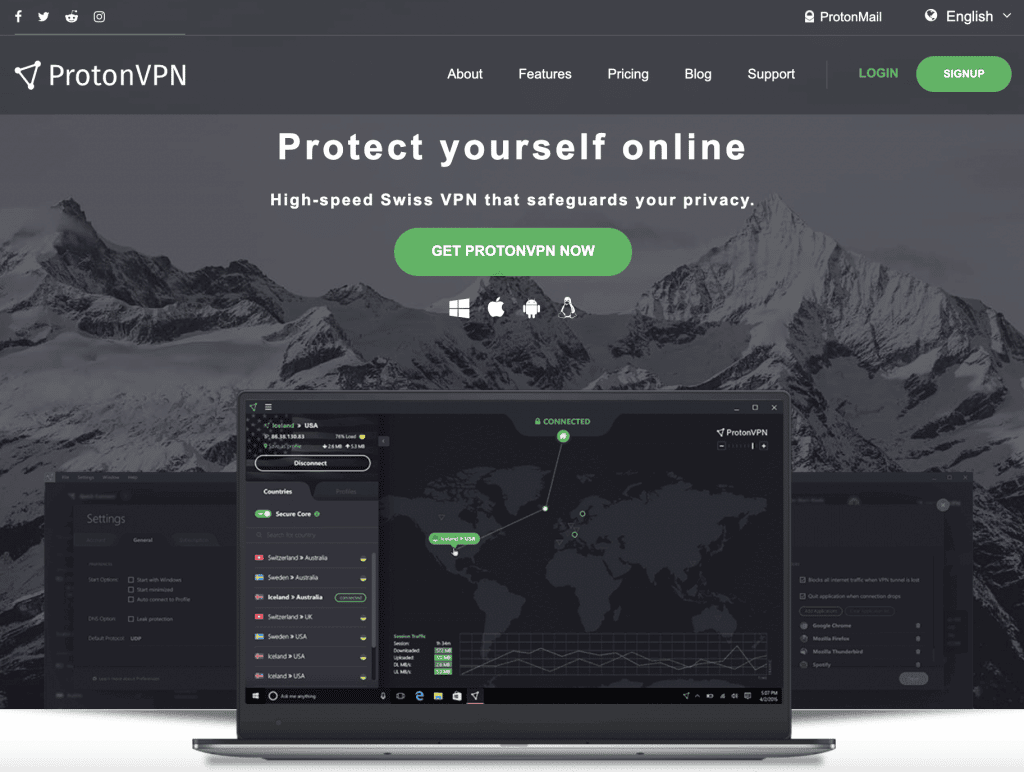
In this section, we’ll let you know about any major changes to ProtonVPN. The biggest recent change is that Proton VPN’s free plan no longer allows you to choose which server you connect to.
Instead, each time you connect, it randomly selects one of five locations: the U.S., the Netherlands, Japan, Poland or Romania. This has dropped Proton a few pegs down for me, as its free plan is now all but useless for streaming, though it’s still good for security.
ProtonVPN Background & History
ProtonVPN is one of the newer VPNs, launched in 2017 by the same team that built ProtonMail. But don’t count this virtual private network out just because it’s barely old enough for grade school.
What Is ProtonVPN?
ProtonVPN is a virtual private network designed to help users browse the internet in privacy. When you activate ProtonVPN and connect to one of its servers, your real IP address is invisible to everyone but the VPN itself, helping you stay anonymous.
Because your internet connection is protected with the VPN’s encrypted tunnel, not even your internet service provider knows where you’re going online.
Who Owns ProtonVPN?
ProtonVPN was founded by a team of scientists at CERN, the Swiss laboratory most famous for a) building the Large Hadron Collider, b) letting a bird drop a piece of baguette into the Large Hadron Collider, and c) inventing the World Wide Web.
The Proton team launched its first project, ProtonMail, in 2014. ProtonMail was the world’s first end-to-end encrypted email service for public use. When you send an email via ProtonMail, nobody but the intended recipient can read it — not even ProtonMail staff.
The team followed it up with ProtonVPN in 2017. It has since launched two other services, Proton Calendar and Proton Drive, which integrate with Proton Mail and ProtonVPN.
Proton has no parent company and is largely community-supported, making this the closest thing to a nonprofit VPN out there right now.
Where Is ProtonVPN Located?
Proton maintains headquarters in Geneva, Switzerland. It benefits from the strong support of the European Union’s strong data laws, grouped under the General Data Protection Regulation (GDPR).
How Safe Is ProtonVPN?
ProtonVPN uses only three protocols: OpenVPN, WireGuard and IKEv2. All three use VPN encryption standards that are the closest thing to uncrackable you’ll find in the real world.
ProtonVPN has never been hacked, but scammers have targeted its users. In February 2020, hackers built a fake ProtonVPN website that downloaded malware onto visitors’ computers. It’s unclear exactly how many machines were infected before researchers at Kaspersky caught on.
How Has ProtonVPN Changed Over Time?
It hasn’t been around long enough to change much, but I’ll make sure to let you know if it does.
ProtonVPN Features
A VPN’s main job is to protect you, but there are many features that can make that task easier — or needlessly difficult. ProtonVPN has a full suite of features, including many I rarely see anywhere else. They work together well enough to make this one of the most option-rich VPNs available, though not every feature is available on all versions.
Basic Features
Evaluating a VPN’s basic functionality is simple. Does it have servers, and can you connect to them without an advanced computer science degree?
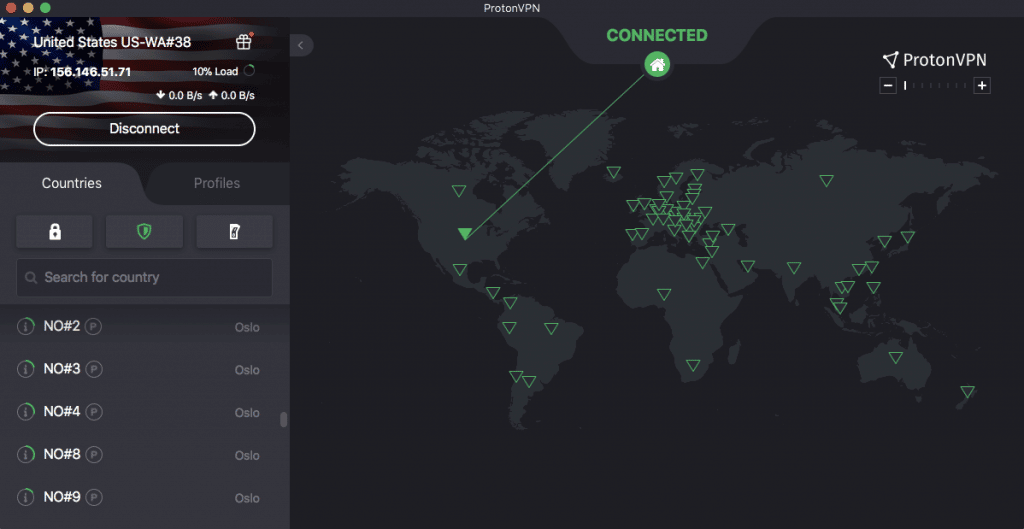
ProtonVPN has servers and makes it easy to connect. If you don’t need any special security features and don’t need to tinker with your settings, you could take this VPN from download to secure browsing in under a minute. Just sign up, click “quick connect,” and go on your way.
Some other basic features can be found under the “general” tab on the preferences menu.
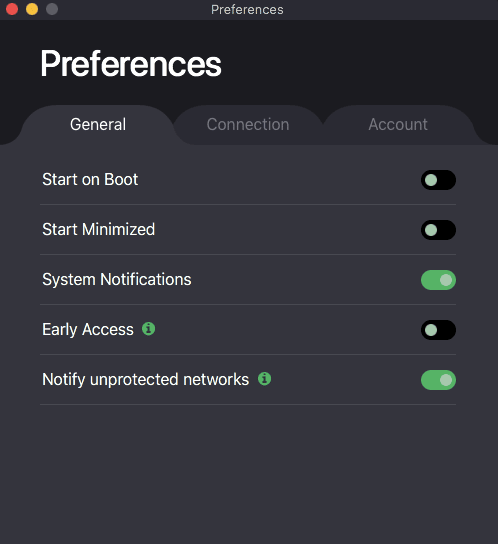
This window lets you toggle whether the VPN starts automatically when you boot up your device, how the app works when you open it and whether to get notifications when you’re using unsafe WiFi (highly recommended). You can activate “early access” to get new updates between stable releases.
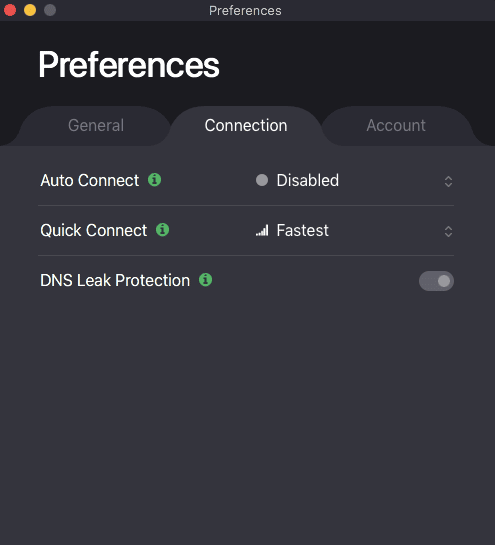
The “connection” features let you choose when the VPN connects automatically and whether it connects to the fastest available server or a random server. You can make the same choices for the quick connect button on the main page.
DNS leak protection can’t be turned off. That’s also one of the most basic VPN features, preventing third parties from seeing what websites you visit, so it’s kind of weird that it’s on here at all.
ProtonVPN also has a kill switch. When active, the kill switch monitors your VPN connection. If it ever drops, the kill switch near-instantly blocks all web traffic, which can save your life on an unsafe WiFi network. ProtonVPN is also an “always-on” VPN, meaning that it immediately reconnects if your connection drops (unless you did it on purpose).
Split tunneling is only available on Windows and Android. This feature lets you divide your internet traffic into two lanes, only one of which runs through the VPN. ProtonVPN lets you split-tunnel based on both IP addresses and apps, which is impressive — it’s usually one or the other with VPN providers.
Advanced Features
Some of these more specialized features are common, and some are unique to ProtonVPN. They’re all niche features that can provide a lot of VPN benefits if you’re in the right circumstances.
There’s an ad and malware blocker. Many people (myself included) prefer not to use their VPN for that, but ProtonVPN NetShield is a good built-in blocker if that’s what you’re into. Just remember that you can’t expect your VPN to moonlight as an antivirus program.
Next up, there’s Secure Core, one of my favorite ProtonVPN features. ProtonVPN has designated Secure Core servers in three countries — Switzerland, Iceland and Sweden — all with strong data privacy protections. If you turn on the Secure Core feature, the VPN will run your connection through a Secure Core server before sending it to its final destination.
Yes, it’s a standard multi-hop feature with extra steps, but I’m not complaining. First, multi-hop connections really are more secure, and second, the Secure Core data centers come with a bonus of strong physical security. The Switzerland center requires biometric access, the Iceland center is a repurposed military base, and the one in Sweden is literally underground.
I can count on one hand the number of VPNs that even pay lip service to physical security. It’s highly sensible to guard against all forms of network attack, not to mention totally awesome.
ProtonVPN has servers optimized for torrenting, though none for streaming — it’s one of the best VPN for torrenting. A few have a Tor Over VPN feature built-in. This feature lets you take advantage of Tor (The Onion Router) protection without having to set it up independent of the VPN. Read our VPN vs Tor guide to learn more.
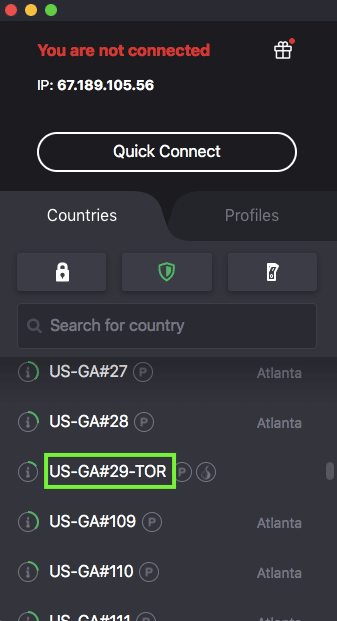
Tor is undoubtedly one of the most secure ways to browse online (that isn’t a VPN). When layered with a VPN, you’re about as safe as you ever will be. Just be warned that some websites block Tor connections automatically.
One other unusual feature about ProtonVPN: it’s open source. Some VPNs make their protocols available on Github, but ProtonVPN is one of the few that make their apps transparent. You can find its source code here.
What Is ProtonMail?
ProtonMail was the first project by the team that would later build ProtonVPN. It’s a fully secure email service with end-to-end encryption, meaning that nobody except the sender and recipient can read any email — sort of like a VPN tunnel but for emails only.
If you sign up for a Proton Unlimited account, the highest pricing tier for all Proton services at $9.99 per month, you can get total access to all four Proton services. It’s a significantly better deal than the old Proton Visionary plan, which is no longer available.
Features List
- Multi-hop servers (Secure Core)
- Tor Over VPN
- Torrenting servers
- NetShield ad and malware blocker
- Open-source
- Kill switch
- Split tunneling (Windows and Android only)
ProtonVPN Cost: Plans & Value for Money
As a donation-supported VPN, ProtonVPN should be able to offer relatively good prices, so it’s a severe disappointment to see how high they are. It’s still a decent value — this isn’t a bare-bones VPN by any means — but only in spite of the premium prices. That being said, it does offer a legitimate free plan and is the best free VPN (I’ll get into that later).
Breaking Down ProtonVPN Pricing & Plans
ProtonVPN recently did away with its overly complicated four-tier structure. It now has three subscription durations, each of which can be bought monthly, annually or in two-year installments. As is customary for many VPNs, all paid plans have the same features.
| Plans: | Monthly pricing | Price at each billing cycle |
|---|---|---|
| Free | $0 | $0 |
| 1 month | $9.99 | $9.99 |
| 1 year | $5.99 | $71.88 |
| 2 years | $4.99 | $119.76 |
All prices are given in euros, but I’ve rendered them in dollars since the two currencies are trading close to 1:1 right now. Regardless of your choice, all subscriptions include a 30-day money-back guarantee.
How to Get ProtonVPN for Free
To use ProtonVPN’s free plan, you’ll have to sign up for an account, but you won’t need to provide any financial information.
Just navigate to the ProtonVPN website, click the green “signup” button, which will load the pricing page. Click the “get free” button, and register for an account. Download the VPN app from the site, sign in using the account you created online, and you’ve got ProtonVPN free.
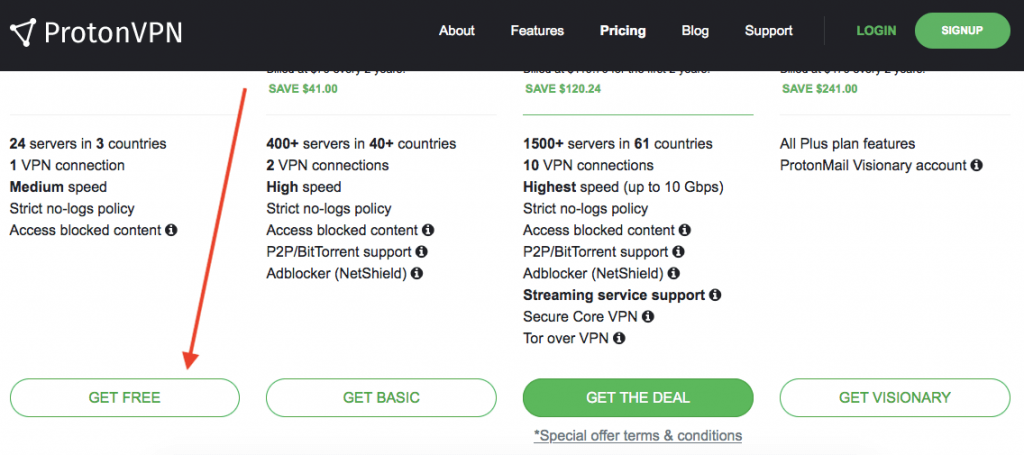
ProtonVPN is the only high-quality VPN service whose free plan has no traffic limits whatsoever. It’s limited in other ways — only one connection, with just a few heavily-used servers that you can’t choose between — but you’ll never run out of VPN protection in the middle of reading the news. Not even Windscribe can say that.
You can also get any of the paid plans for free using the money-back guarantee, but that only works for 30 days. It’s useful if you only need the VPN for a specific time (like a two-week trip to China).
ProtonVPN Pricing Deals
I’ll update this section as new ProtonVPN pricing deals become available.
Apps & Support
ProtonVPN has apps for a reasonably wide range of devices. Windows, macOS, Android and iOS are all represented. It also supports Linux, Chromebooks (via the Android app) and Android TV. Unfortunately, there are no browser extensions.
ProtonVPN can be set up on a router, which protects every device connected through your home WiFi — including ones that aren’t explicitly supported, like Amazon Fire Sticks or game consoles. It’s not easy, but there’s a support page to walk you through it.
What Devices Work With ProtonVPN?
- Desktop: Windows, macOS, Linux
- Mobile: Android, iOS
- Smart TV: Android TV, others via router
- Routers: InvizBox 2 (specifically designed for ProtonVPN), most other types
Servers & Server Locations
When discussing why its cheaper tiers have lower speeds, ProtonVPN explains that servers with more users always run slower — for the same reason it takes longer for the restaurant to serve your food during dinner rush.
That’s why it’s so important for a VPN to have a large server network. Having more servers means more people can use the VPN at once without slowing it down. It’s also important for the servers to be evenly distributed across the world, since speeds decrease when you’re too far from a node in the VPN server network.
ProtonVPN does very well on both metrics. It has 67 server locations on six continents, including some countries that often get ignored. The total works out to 2,915 servers, only slightly lower than its major competitors.
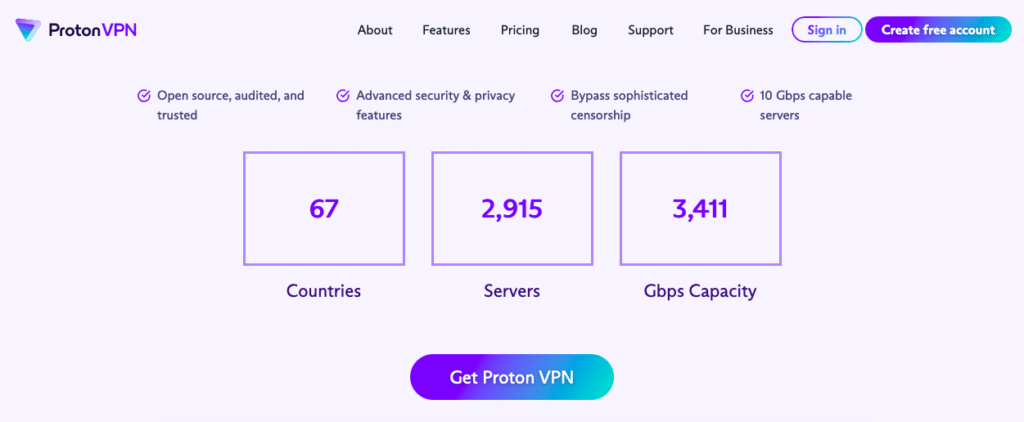
How Many Servers Does ProtonVPN Have?
At the time of writing, ProtonVPN has a total of 2,915 servers. Together, they can handle 3,411 gigabytes of traffic per second.
The servers are limited by plan. Free users can only access servers in the United States, the Netherlands, Poland, Romania and Japan, and cannot choose which location they connect to.
Out of the paid servers, 94 are Secure Core servers. Although all these are physically located in Sweden, Iceland or Switzerland, their virtual locations are assigned to all 67 countries with ProtonVPN servers.
Where Are ProtonVPN Servers Located?
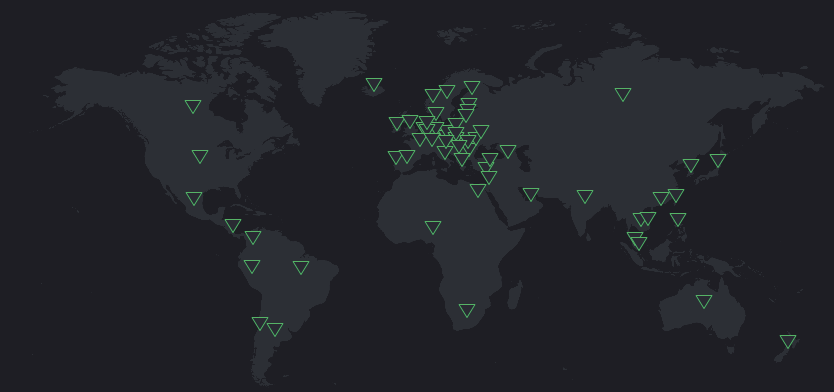
ProtonVPN has most of its servers in North America, Europe and East Asia. That’s typical, but it also serves seven countries in Latin America, one of the best showings in a region many VPNs bypass entirely. There are also three server locations in Africa.
I’m very happy with ProtonVPN’s server distribution. The website could do more to make it clear how many servers are located in each country, but that’s a minor complaint.
Speeds & Performance Testing
ProtonVPN is one of the best VPNs for fast download and upload speeds in most locations, but its latencies can be frustratingly high.
I’m based in Portland, Oregon, with several ProtonVPN’s servers near me. But I like to explore how well a VPN works at many distances because you never know what country you’ll find yourself needing to spoof.
My speed tests compared ProtonVPN servers to my unprotected connection in three areas: latency, download speed and upload speed.
Latency, measured by ping length in milliseconds, is the time it takes one data packet to move from one device to another. Since even digital data has to travel through physical space, latency tends to increase with distance. Latency is important for live functions, like chatting or gaming.
Download speed and upload speed are both measured in megabits per second (Mbps) and measure how much traffic can move from the internet to your device (download) or from your device to the internet (upload) at a time.
Download speed is important for loading pages quickly and streaming video. Upload speed is important for any task that involves uploading content, such as posting and scheduling on social media.
How Fast Is ProtonVPN?
| Server location: | Latency (ms) | Download speed (Mbps) | Upload speed (Mbps) |
|---|---|---|---|
| Portland, Oregon, United States (unprotected) | 26 | 51.54 | 5.92 |
| United States | 182 | 51.12 | 5.58 |
| United Kingdom | 327 | 30.77 | 5.61 |
| India | 533 | 15.40 | 5.52 |
| South Africa | 712 | 27.21 | 4.64 |
| Brazil | 159 | 43.41 | 5.40 |
| Australia | 409 | 38.05 | 5.62 |
Let’s start with download speed. I hardly saw it budge on the U.S. server, which ProtonVPN named the fastest in the network. As long as you’re near a server, ProtonVPN can load pages with blinding speed.
Its record abroad was mostly good, with a few marks against it. I generally look for a reduction of less than 50%. By that metric, ProtonVPN knocked it out of the park everywhere except India. Upload speeds were also great, hardly dropping at all between continents except for one sizable decline in South Africa.
The big problem was latency. Pings shot up immediately, even within the United States, and stayed high — topping 700 anywhere is not a good sign. I expect latency to rise with distance, but ProtonVPN’s increases are higher than the baseline increase.
The tests told me that ProtonVPN is a great choice for regular web browsing, streaming, posting and asynchronous communication. It’s not a great choice for video chatting or gaming.
What Is VPN Accelerator?
I want to say a brief word here about VPN Accelerator, a technology ProtonVPN claims will “improve VPN speeds by over 400%.” VPN Accelerator is enabled by default, and on most versions of the app, you can’t deactivate it. There’s also no clear reason why you would.
This makes the 400% figure meaningless. It doesn’t matter whether a VPN is now five times faster than a prior version because nobody will use it. ProtonVPN is a mostly fast and high-performing VPN and can stand on its own without marketing gimmicks like this one.
Streaming & Torrenting
Between its fast download speeds and its talent at bypassing VPN bans, ProtonVPN is one of the best VPNs for streaming — altogether. I tried multiple servers, protocols and streaming sites. Every one of them went through and connected us to Netflix and other streaming sites.
So why only 95? Because the servers that unblocked streaming sites were all in the Plus network. Free and Basic users are far less likely to get the holy grail of access and good speeds. ProtonVPN is a fantastic VPN for streaming, but only if you pay full price.
Can ProtonVPN Unblock Netflix or Other Streaming Sites?
ProtonVPN was able to unblock the following streaming platforms: Netflix, Hulu, Amazon Prime Video, BBC iPlayer, Disney+ and HBO Max.
Is ProtonVPN Good for Torrenting?
ProtonVPN offers several servers optimized for P2P file sharing. A two-way arrow symbol next to a server’s name designates it as torrent-friendly.
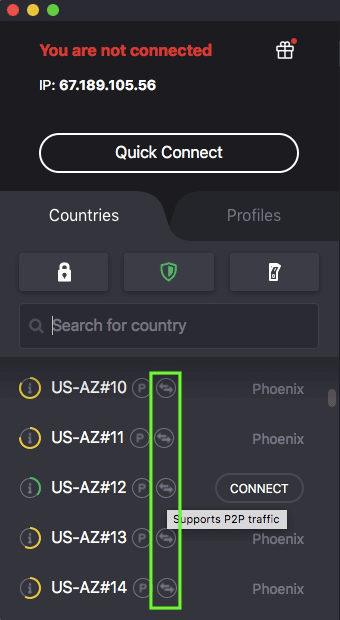
You’ll have to get a paid subscription of at least Basic level to access any P2P servers.
ProtonVPN Security: Encryption & Protocols
Security is the goal that originally brought the ProtonVPN team together at CERN, and it’s remained a priority since the 2017 launch.
ProtonVPN offers three security protocols: OpenVPN, WireGuard and IKEv2. All three meet a high standard for security, including AES-256 encryption and 4,096-bit RSA key exchange (the kind trusted by banks and governments).
ProtonVPN also pays attention to a crucial but oft-overlooked concept called Perfect Forward Security. To have Perfect Forward Security, an encryption cipher must generate a completely new key for each use. If a hacker gets ahold of one session’s key, they won’t be able to decode any other sessions — sort of like a building that changes passwords every day.
Another welcome security feature is full-disk encryption. Everything on every ProtonVPN server is encrypted, from the software to the metadata. If authorities ever seized a ProtonVPN server (something that happens with VPNs on occasion), all they’d see would be gibberish.
I’ve already gone over the physical security on the Secure Core servers. Even if ProtonVPN can’t store every server in an Icelandic military base, I give them credit for doing that with any of them.
ProtonVPN guaranteed its security by hiring SEC Consult to audit all its apps in 2019. You can find the results in this blog post.
Is ProtonVPN Safe?
It’s very safe. The only moment in its history that could be called a security breach was the fake phishing website set up to look like its homepage, which I don’t count as a vulnerability in the VPN itself. Read our “are VPNs safe” guide to learn more.
Privacy & Logs
Every serious VPN company has a no-logging policy at this point. To find one that actually won’t log or sell your browsing history, you have to learn to read between the lines.
ProtonVPN has a strong privacy policy without any detectable loopholes. It only retains your account username, associated email and any bug report information you willingly send. It uses anonymized analytics to track user behavior on its website and handles all payments through third-party apps.

The only way ProtonVPN could do better would be to follow Mullvad’s lead and ID every user account with nothing but a randomly generated number. Short of that, it’s doing a great job.
Does ProtonVPN Keep Logs?
No, ProtonVPN does not keep, share or save any data about what you do online. However, the privacy policy admits that ProtonVPN will share your username and email address with authorities if compelled to, but with no more information than that, it can’t do much harm.
Customer Support & Service
ProtonVPN has fine customer support, but with no live chat, it’s harder to get fast help than it should be.
Support starts with the knowledgebase. The articles are organized into seven distinct categories (well, six and one vague “general information” section). Each article goes into a good amount of detail with plenty of screenshots. However, I would have liked the troubleshooting section to be more extensive, as that’s the first place most users go with a problem.
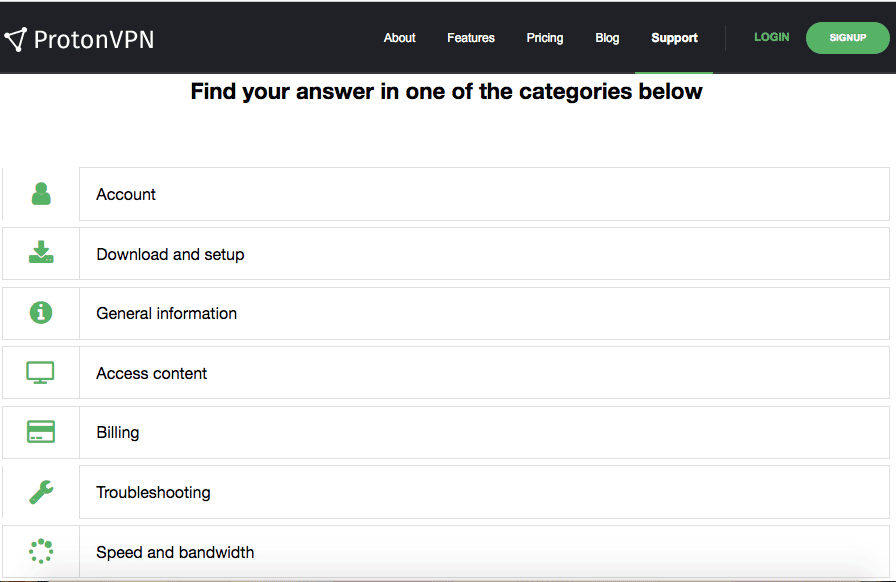
If you can’t find answers on the support page, you’ve got two options. The first is the r/ProtonVPN subreddit, one of the most active VPN communities with regular engagement from the ProtonVPN team itself. However, Reddit can be intimidating for new users, so I don’t like asking people to rely on it for help.
Your other option is to send an email using the button at the bottom of every knowledgebase article. It can take the support staff several hours to reply, but they aim to do it within one business day.
How to Contact ProtonVPN
You can find the “contact our support team” button at the bottom of the main support page and also at the bottom of every article. Or just follow this link.
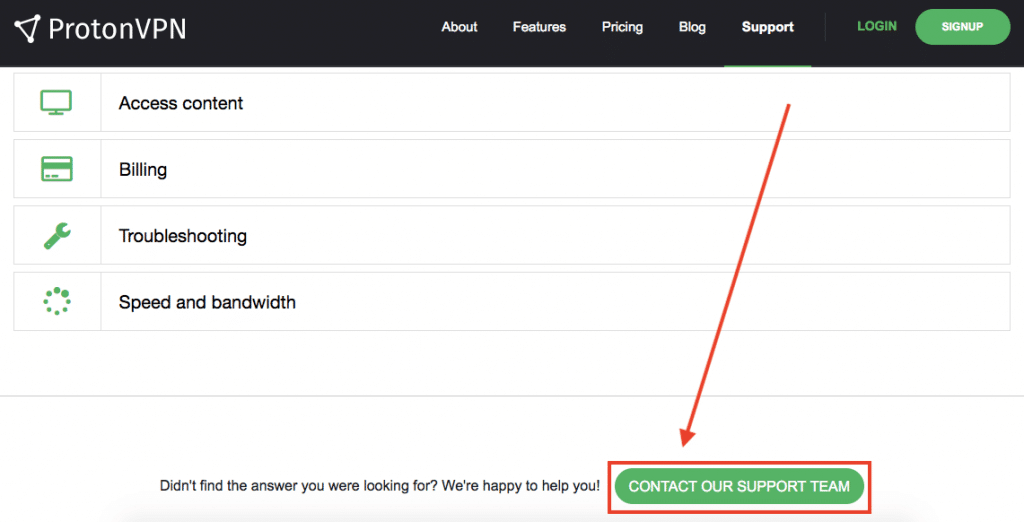
To submit a help ticket, you’ll need at least three pieces of information: the version of ProtonVPN you’re using, an email address and a brief description of what’s gone wrong.
Ease of Use
ProtonVPN has a fairly standard VPN interface, simple for newcomers and easy for everyone to use. Buttons are large and obvious, and menus aren’t too complex. The only major drawback is that the server search box only searches for countries. In nations like the United States that have hundreds of servers, it’s hard to find the one you need.
I want to close out by touching on a feature I haven’t discussed yet: user profiles. This is a reasonably unique perk that I didn’t notice right away because I thought it referred to the different “seats” that came with a subscription. It’s something else entirely.
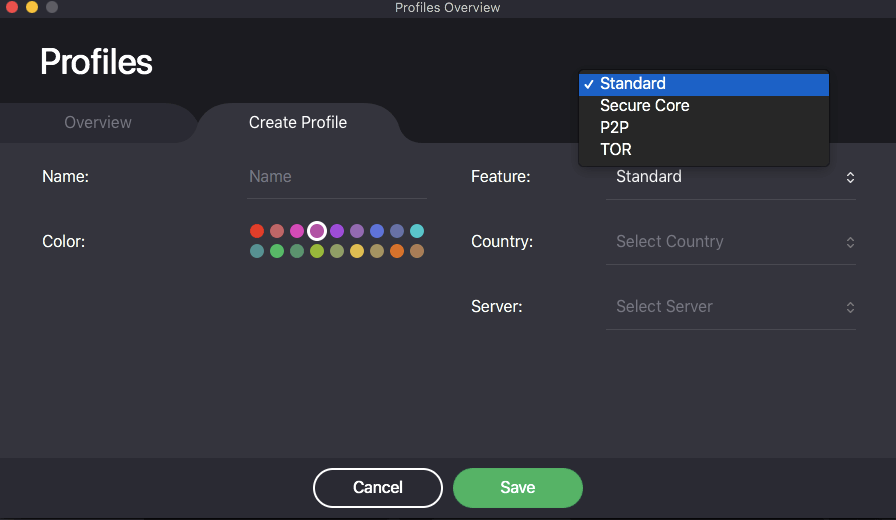
ProtonVPN comes pre-loaded with two profiles: “fastest,” which connects to the fastest server available, and “random,” which connects to a different server each time. Any new profiles you create can feature a type of server, a country and/or a specific server.
Profiles are a great way to switch ProtonVPN’s focus with one click. You can set up a profile for torrenting, one for high-security information and one for when you’re just chilling with Netflix. It’s a nice touch that proves ProtonVPN is thinking about its users’ comfort.
Bottom Line: Do I Recommend ProtonVPN?
ProtonVPN is so close to perfect. Its download and upload speeds are excellent. Its user interface hardly has a blemish. It gets into every streaming platform. It’s so focused on security that it makes other VPNs look like amateurs, and all its features are actually useful. And there’s nothing like a free plan with unlimited bandwidth. (Head to ProtonVPN’s website here.)
Even so, I’m careful to recommend it for two reasons. First, its latencies are much slower than I’d like, and second, the price is steeper than it should be. It’s an excellent service, but comparable VPNs go for less.
Still, I’m pleased to advocate for ProtonVPN in 90% of cases. If it adds a few more servers and its prices fall more in line with the industry average, this could easily crack my top three.
ProtonVPN Alternatives
If ProtonVPN’s drawbacks are too much for you, here are three VPNs you might try instead.
NordVPN is the best VPN overall.
Surfshark is a fast VPN with a rapidly expanding server network. If ProtonVPN doesn’t have a location near you, Surfshark might be able to deliver. Read my Surfshark review here.
ExpressVPN is a great all-around VPN. It’s just as good as ProtonVPN at unblocking streaming services but has much better latencies for streaming from other countries. Read my ExpressVPN review here.
- $4.13 per month for a 2-year plan ($99.12 for two years); 11.95 monthlyA fast VPN service at a fair price.Pros
- Easy to operate
- Unblocks every major streaming service
- Great savings on one- & two-year plans
- Includes a kill switch & ad blocker
- Strict no-logs policy
- 30-day money-back guarantee
- $2.21 $12.95 per month, $6.49 per month for 6 months, $2.49 per month for 24 monthsSurfshark is an innovative VPN with good all-around features.Pros
- Very good price-performance ratio
- High security level
- Netflix-compatible
- Unlimited simultaneous connections
- Great support with live chat
- $6.66per month annually (15 months for $99.95); $12.95 monthlyExpressVPN is an easy-to-use and highly secure VPN, but it can be pricey.Pros
- Extremely fast & easy to use
- Servers in 105 countries
- Kill switch, split tunneling & no logs
- Unblocks all major streaming services
- Excellent security record

Leave a Reply